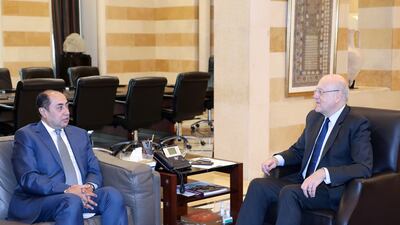An Arab League delegation met Lebanese leaders in Beirut on Monday in an attempt to mediate a dispute between Saudi Arabia and Lebanon that escalated into a full-blown diplomatic row last week.
A Lebanese minister expressed views supporting the Iran-backed Houthis in Yemen two weeks ago, prompting Riyadh and other Gulf nations to cut ties with Lebanon.
The rift has added strain to Beirut’s economic meltdown, as the country relies on the Gulf for a large part of its exports and remittances from Lebanese diaspora living there.
Hossam Zaki, Assistant Secretary General of the Arab League, said that organisation could "play a key role" in restoring ties between Lebanon and Gulf countries.
"My visit to Lebanon is in itself an initiative to put the crisis between Lebanon and the Gulf on the right track," he said after a meeting with Prime Minister Najib Mikati.
Mr Zaki met the leaders of Lebanon’s three main sects: Christian President Michel Aoun, Shiite Speaker of Parliament Nabih Berri and Sunni prime minister Mr Mikati.
He said the talks were positive and that "if there is a need to visit Saudi Arabia, I will do it.”
Saudi Arabia, Bahrain, Kuwait and the UAE all recalled their ambassadors to Lebanon.
Riyadh, Kuwait and Bahrain also instructed Lebanon’s representatives to leave their respective countries. Riyadh imposed an import ban on Lebanon, cutting diplomatic ties completely with Beirut.
Information Minister George Kordahi, who sparked the controversy, has refused to step down from his post or apologise. Mr Mikati has twice asked him to make the right decision for the country but stopped short of asking him to resign.
Mr Kordahi is backed by the Iran-aligned Hezbollah, an armed group and political party that wields great influence over Lebanese politics and is at loggerheads with Saudi Arabia. Hezbollah supports the Houthi rebels, who are fighting Yemen’s Saudi Arabia-backed, internationally recognised government.
A source close to Mr Aoun said Mr Zaki did not discuss specific solutions to the dispute.
“They didn’t go into details about Kordahi resigning but there is a will from the Arab League to find a solution, separately from the Hezbollah file,” the source said.
Prince Faisal bin Farhan, Saudi Arabia's Foreign Minister, said last month that the kingdom was not interested in dealing with Lebanon because the country is dominated by Iran-backed Hezbollah.
Beirut is two years into an economic meltdown that has pushed more than 70 per cent of its population into poverty. Riyadh was a historic ally and investor for Lebanon but those close ties have been strained in the past decade by Hezbollah's dominance.
Mr Zaki told local media after meeting Mr Berri that “Kordahi’s resignation was ... on the table", and that if he had resigned earlier, the crisis could have been averted.
A spokesman for Mr Berri told The National over the phone that Saudi Arabia had given its blessing to the mediation attempts.
“The Arab League is seeking to mediate between Lebanon and KSA, and this is an initiative that has Saudi support. The Lebanese side of course supports this initiative too,” he said.
Mr Zaki could not be reached for comment at the time of publication.







